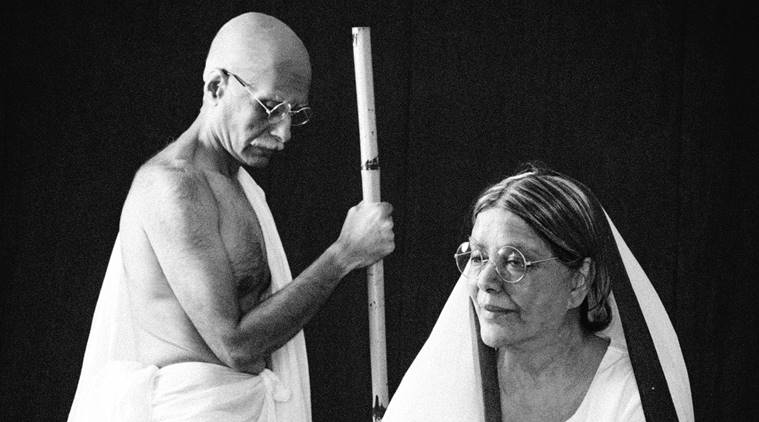 Saif Hyder Hasan (left); a scene from Dearest Bapu, Love Kasturba
Saif Hyder Hasan (left); a scene from Dearest Bapu, Love Kasturba
A few days ago at the rehearsal of the play Dearest Bapu, Love Kasturba, theatre director Saif Hyder Hasan joked, “Why don’t we replace Azad Maidan (a site of speeches and protests in Mumbai during the freedom struggle) with Shaheen Bagh (in Delhi, where a large gathering of women has been protesting the CAA-NRC since December 2019)? At the end of the day, isn’t it the same thing?” Hasan’s understanding of the present begins by staring at the past.
His “relationship plays” Ek Mulaqaat, about the unfulfilled love of Amrita Pritam and Sahir Ludhianvi, and Gardish Mein Taare, about the turbulent marriage of Guru Dutt and Geeta Dutt, were also journeys into the histories of art, films and literature. Now, Mumbai-based Hasan is exploring the marriage of Mahatma Gandhi and Kasturba in the play Dearest Bapu, Love Kasturba. Starring Zeenat Aman as Kasturba and Arif Zakaria as Gandhi, the story begins with the Quit India Movement and Kasturba writing a letter, where she tells Gandhi, “You weren’t an easy man to live with”. Excerpts from a conversation with Hasan:
You have directed film actors Deepti Naval, Shekhar Suman and Satish Kaushik in plays. What prompted
you to bring back Zeenat Aman in a new role?
When I was coming up with names for the role, I thought of the usual ones who were similar to Kasturba. Then, I thought, ‘Nobody will link Zeenat to Kasturba’. She has been a huge star and an actor who isn’t done and dusted. You would want to watch her perform. I knew she had done theatre. Ramesh Talwar had directed her in the play, Chupke Chupke, and Divya Palat in a Broadway-style show, The Graduate, where she played Mrs Robinson. I had met her 10 years ago for another play, Mirror Mirror On The Wall.
What drew you to the story of Ba and Bapu?
Three years ago, I wanted to write a three-woman story on the wives of Ghalib, Jawaharlal Nehru and Mahatma Gandhi. Then, I realised that I would be devoting only half an hour to each of these women. The play is about companionship of 65 years and talks about the moments of togetherness and upheavals. I find this interesting, especially since relationships are failing left, right and centre.
What are the characteristics of Kasturba that you bring out in your play?
She is a woman of her times but, at the same time, she has a voice of her own. About Gandhi’s vow of celibacy, she says, ‘It was not easy for me to go with it. It pained me but I went along with it, as with all the other things’. She was a young woman in her 30s when he took the vow. I had to edit out a lot of portions but there is a part when she says, about Mahatma Gandhi and their son, Harilal, that the former became a father to a nation but not so much to his children.
How would these relate to the feminist ideas of the modern woman?
Whenever Gandhi would fast, she would go on a one-meal diet and fall sick. At Aga Khan Palace in Pune, Gandhi went on a fast. Kasturba, who had already suffered a heart attack, went on a diet of bananas and milk once a day, and collapsed. She did not recover. Today’s woman, would she do it? I doubt. You have to see this according to the times in which she was living. History fascinates me. My problem with contemporary society is that people have no sense of history. When right-wing talks about Babar destroying a temple, I do not justify it but I say, ‘Those were pre-Constitution times. Those were medieval times’. We need to develop a sense of history. Why do we keep looking at the past through the spectacles of the present?
The play opens at NCPA, Mumbai, on February 21, and at Siri Fort auditorium on February 22, 5 pm and 8 pm.